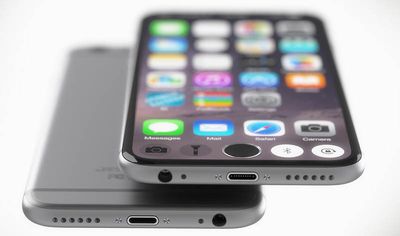Apple Orders Display Driver Chips From Synaptics for Next iPhones
Apple has placed LCD display driver orders with touchscreen supplier Synaptics for its next-generation iPhones, indicating the Cupertino-based company's in-house development of touch and display driver integration (TDDI) chips may have fallen behind schedule, according to Taiwanese website DigiTimes.

iPhone 7 concept with integrated Touch ID by designer Martin Hajek Synaptics
acquired Renesas SP Drivers, reportedly the sole supplier of LCD driver ICs for iPhones, in September 2014 in an effort to maintain orders from Apple, and for now it appears the iPhone maker will remain one of its customers. The supplier also works with Google, HTC, Microsoft, Samsung, Sony and other smartphone makers.
Apple previously recruited senior Renesas engineers to internally develop TDDI chips with Touch ID integrated into the display. The single-chip solution could allow for the Home button to be eliminated on future iOS devices, but Apple ordering regular display drivers from Synaptics indicates the technology may not be ready for the iPhone 7.
Apple has filed multiple patents for displays with integrated Touch ID and trackpad capabilities over the past few years, and the iPhone 7 lineup is due for a significant redesign, but it remains too early to predict whether Apple will ever remove its iconic Home button on future iPhones.
In March, Synaptics announced the first TDDI single-chip solutions for smartphones and tablets, allowing for thinner and brighter displays with best-in-class capacitive touch performance. The reduced number of components, fewer lamination steps and increased manufacturing yield of TDDI chips also lowers production costs.
Popular Stories
Apple is developing a MacBook with the A18 Pro chip, according to findings in backend code uncovered by MacRumors.
Earlier today, Apple analyst Ming-Chi Kuo reported that Apple is planning to launch a low-cost MacBook powered by an iPhone chip. The machine is expected to feature a 13-inch display, the A18 Pro chip, and color options that include silver, blue, pink, and yellow.
MacRumors...
Apple's next-generation iPhone 17 Pro and iPhone 17 Pro Max are less than three months away, and there are plenty of rumors about the devices.
Apple is expected to launch the iPhone 17, iPhone 17 Air, iPhone 17 Pro, and iPhone 17 Pro Max in September this year.
Below, we recap key changes rumored for the iPhone 17 Pro models:Aluminum frame: iPhone 17 Pro models are rumored to have an...
In 2020, Apple added a digital car key feature to its Wallet app, allowing users to lock, unlock, and start a compatible vehicle with an iPhone or Apple Watch. The feature is currently offered by select automakers, including Audi, BMW, Hyundai, Kia, Genesis, Mercedes-Benz, Volvo, and a handful of others, and it is set to expand further.
During its WWDC 2025 keynote, Apple said that 13...
Apple hasn't updated the AirPods Pro since 2022, and the earbuds are due for a refresh. We're counting on a new model this year, and we've seen several hints of new AirPods tucked away in Apple's code. Rumors suggest that Apple has some exciting new features planned that will make it worthwhile to upgrade to the latest model.
Subscribe to the MacRumors YouTube channel for more videos.
Heal...
Apple is planning to launch a low-cost MacBook powered by an iPhone chip, according to Apple analyst Ming-Chi Kuo.
In an article published on X, Kuo explained that the device will feature a 13-inch display and the A18 Pro chip, making it the first Mac powered by an iPhone chip. The A18 Pro chip debuted in the iPhone 16 Pro last year. To date, all Apple silicon Macs have contained M-series...
Popular accessory maker Anker this month launched two separate recalls for its power banks, some of which may be a fire risk.
The first recall affects Anker PowerCore 10000 Power Banks sold between June 1, 2016 and December 31, 2022 in the United States. Anker says that these power banks have a "potential issue" with the battery inside, which can lead to overheating, melting of plastic...
Chase this week announced a series of new perks for its premium Sapphire Reserve credit card, and one of them is for a pair of Apple services.
Specifically, the credit card now offers complimentary annual subscriptions to Apple TV+ and Apple Music, a value of up to $250 per year.
If you are already paying for Apple TV+ and/or Apple Music directly through Apple, those subscriptions will...
As part of its 10-year celebrations of Apple Music, Apple today released an all-new personalized playlist that collates your entire listening history.
The playlist, called "Replay All Time," expands on Apple Music's existing Replay features. Previously, users could only see their top songs for each individual calendar year that they've been subscribed to Apple Music, but now, Replay All...
Apple's next-generation iPhone 17 Pro and iPhone 17 Pro Max are around three months away, and there are plenty of rumors about the devices.
Apple is expected to launch the iPhone 17, iPhone 17 Air, iPhone 17 Pro, and iPhone 17 Pro Max in September this year.
Below, we recap key changes rumored for the iPhone 17 Pro models:Aluminum frame: iPhone 17 Pro models are rumored to have an...

























